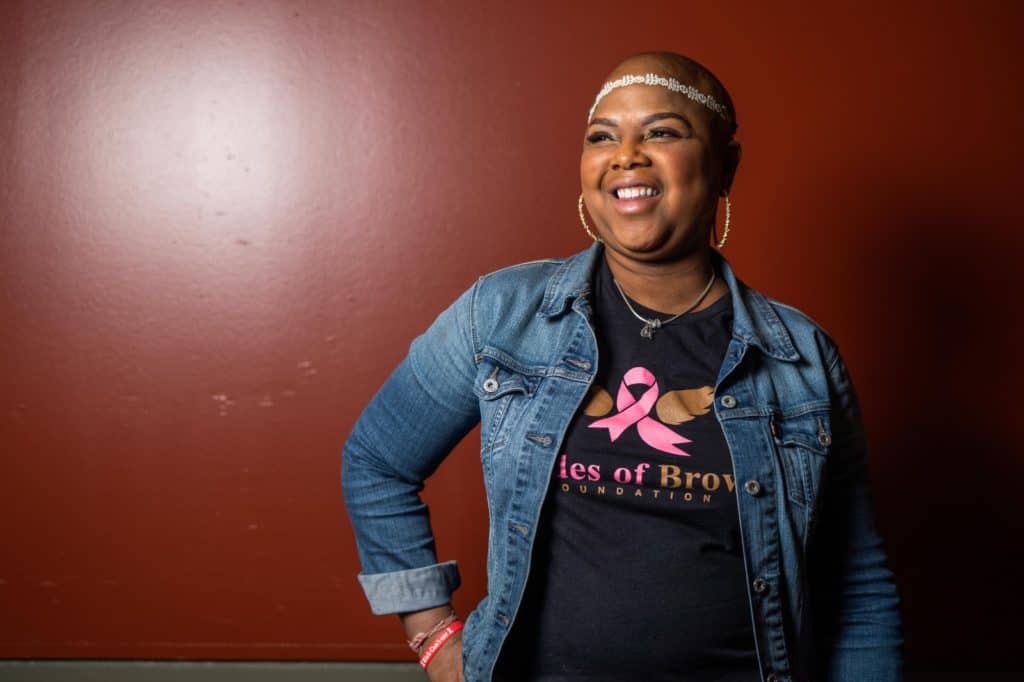
We are sad to share that Sheila Johnson (formerly McGlown) passed away in April 2024.
Sheila McGlown, who is living with metastatic breast cancer, is an advocate for clinical trials. She talked with Susan G. Komen about her experience participating in a trial and ways doctors could help make patients more aware and interested in joining a clinical trial.
Komen: Tell us about your diagnosis and what was going through your mind.
McGlown: At 43 years old, the last thing I could think about was being diagnosed with breast cancer. My diagnosis turned out to be stage IV breast cancer. At that time, I wasn’t even aware there were four stages of breast cancer or that black women even got breast cancer. The only other black person I had known that had breast cancer was my mom. In my mind, I was this small person in a big world trying to navigate through how I was going to deal with breast cancer. How was I going to tell my dad that the same disease that killed my mom is what I now had?
Komen: How are you processing the news that you have incurable breast cancer?
McGlown: My prayer to God has always been if breast cancer had to invade my family again, I’m glad it was me, because I don’t want my sisters, my daughter, or anybody to get this disease. It was a trying time at 43 years old and I wanted to see my daughter graduate. She was in college studying for her bachelor’s degree. I had also just bought a house. In that situation, your whole life flashes before you, and it’s almost like you’re rushing through life. I had dreams of traveling to Bali, Hawaii, among other places. And all I could think of was, “Am I going to be able to do this?” It was a difficult time, but I’m still here.
Komen: I understand you enrolled in a clinical trial for treatment for your breast cancer. How did you make that decision?
McGlown: I initially thought of clinical trials as treating African Americans like guinea pigs. In African American culture, you think back to the Tuskegee, and Henrietta Lacks and how they used her cells without her consent. My first thoughts were, “What are they going to use my body for?” I wondered, “What are they using my tissue for?” After much consideration, I figured, “If something does happen to me, I would want my body to go towards research. I want them to understand why I’ve lived 10 years post diagnosis while my mom only lived for 3 years with breast cancer.”
Komen: How did you first learn about a clinical trial you could join?
McGlown: I had a fourth progression of breast cancer in July of 2018. The cancer showed progression in my fourth rib. My doctor referring to other treatments said, “Well, you can go back on Taxotere or Taxol; but I’ve got a clinical trial that you could try, and I would like for you to try it. It’s supposed to be the next big thing.” I replied, “Sure, let’s try it.”
The thing is, this cancer is not about Sheila. It never was and never will be. It’s about who I can help and who I can encourage. It’s about who can look at me and say, “Well, Sheila tried that clinical trial. Maybe there’s something to clinical trials.” I’m glad that I have that patient-doctor relationship with my doctor because I trust her. We started all the pre-tests and as of July 2020, I have been on the trial for 24 months and I’ve been doing very well on it. So far, my 6-week scans confirm that I’m stable. In the metastatic breast cancer world, stable is good. You want to be stable.
Komen: Would you encourage other women, particularly African American women, to join a clinical trial, if they’re able?
McGlown: Yes, especially among the African American community, because we’re dying at a more than 40% higher rate. We need the science. We need to know why our breast cancer is genetically different. This is top notch research. This is research that is going to help us. It’s not only helping me, but it’s going to help generations, 10, 15 years from now. And when I talk, I tell researchers, “Include African American women in your research, recruit African Americans in your trials.”
Komen: What could doctors do differently to include more African American women in their clinical trials?
McGlown: When I talk to physicians and oncologists, I tell them, “You have to understand our culture, too. First, understand the biases we face and the culture we’re coming from and then you can approach us with clinical trials and other options.” It’s important for physicians to understand the mistrust in the medical system that African American people have, the thoughts that doctors could be using us as guinea pigs. I keep saying it; it dates back to how African American people were treated years ago and it’s relevant today. That’s the first thing you think about. So it’s all about education.
For me, it’s about educating the African American community about clinical trials and making sure they have the information needed to make informed decisions about their care. Clinical trials are not always a last resort, it wasn’t for me.



